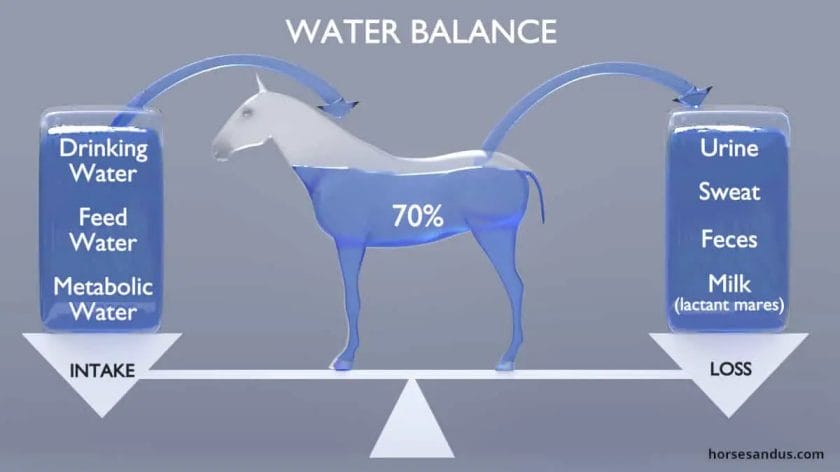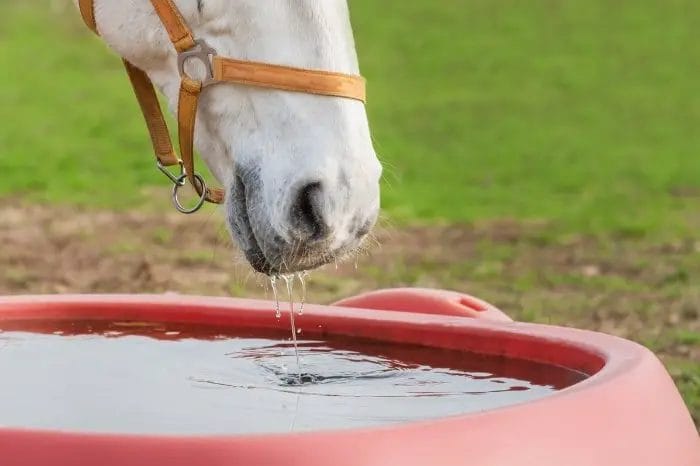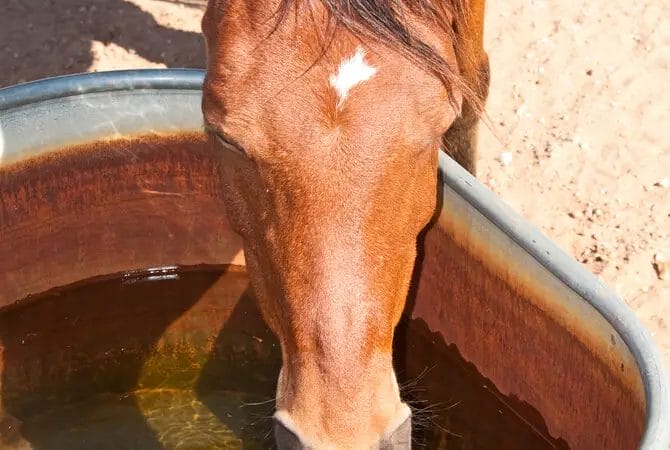Adequate water intake is crucial for a horse’s overall health and well-being. The amount of water a horse should drink in a day depends on several factors, including its size, activity level, and environmental conditions. On average, a horse requires about 5 to 10 gallons of water per day. However, during hot and strenuous activities, this amount can significantly increase. It is essential to provide clean and fresh water at all times to ensure proper hydration and prevent dehydration-related issues.

Factors influencing a horse’s water consumption: What you need to know
Water is an essential component of a horse’s diet, as it plays a crucial role in various bodily functions and overall health. Understanding the factors that influence a horse’s water consumption is important for horse owners and caretakers in order to ensure that their equine companions are adequately hydrated. In this section, we will explore the key factors that can impact a horse’s water intake.
1. Climate and Weather Conditions
The climate and weather conditions have a significant impact on a horse’s water needs. Horses tend to drink more water in hot and humid climates as they lose fluids through sweating, which is their primary mechanism for thermoregulation. It is important to provide horses with access to clean and fresh water at all times, especially during hot summer months.
2. Activity Level
The activity level of a horse also influences its water consumption. Horses that are engaged in strenuous physical activities such as racing, eventing, or endurance riding may require more water to replenish the fluids lost through exertion. It is crucial to offer sufficient water breaks during and after intense workouts or competitions to keep the horse properly hydrated.
3. Diet and Forage Type
The type of diet and forage a horse consumes can impact its water intake. Horses that consume primarily dry hay or concentrates may require more water compared to those on a fresh pasture diet. This is because dry feeds have a lower moisture content, leading to increased water requirements to aid in digestion and prevent dehydration.
Furthermore, horses consuming diets high in salt or electrolytes may also have an increased need for water. Salt acts as a natural thirst stimulant, encouraging horses to drink more water and maintain a healthy hydration balance.
4. Health and Medical Conditions
Health and medical conditions can also affect a horse’s water consumption. Horses with certain health issues, such as kidney problems or urinary tract infections, may experience increased thirst and subsequently consume more water. It is important to monitor any changes in water intake and consult a veterinarian if there are any concerns or significant deviations from the horse’s usual drinking behavior.
5. Water Quality
The quality and palatability of water can influence a horse’s willingness to drink. Horses generally prefer clean, fresh, and odor-free water. Water that is unclean or has an off-putting taste or smell may discourage horses from drinking an adequate amount. Regularly cleaning and refilling water troughs or buckets can help ensure that horses have access to clean water.
6. Availability and Accessibility
The availability and accessibility of water sources also play a role in a horse’s water consumption. Horses should have constant access to water, whether through pasture streams, automatic waterers, or buckets. Additionally, it is essential to monitor water levels and ensure that horses can easily reach their water source without any obstacles or difficulties.
In summary, several factors can influence a horse’s water consumption. Climate, activity level, diet, health conditions, water quality, and availability all play significant roles in determining a horse’s water needs. By understanding and addressing these factors, horse owners and caretakers can ensure that their horses remain properly hydrated, which is vital for their overall health and well-being.

Monitoring your horse’s hydration levels: Signs of adequate water intake
Proper hydration is essential for the health and well-being of your horse. As a responsible horse owner, it is crucial to monitor your horse’s hydration levels to ensure they are consuming enough water. In this section, we will discuss the signs that indicate your horse is adequately hydrated.
1. Elastic skin
One of the easiest ways to check your horse’s hydration level is by performing a skin pinch test. Gently pinch a small fold of skin on your horse’s neck or shoulder, then release it. If your horse is well-hydrated, the skin will quickly return to its normal position. Dehydrated horses may have slower skin elasticity, and the skin will take longer to spring back into place.
2. Moist gums and mucous membranes
Another indicator of proper hydration is the moisture level of your horse’s gums and mucous membranes. In a well-hydrated horse, the gums should appear moist and slick. Dry or sticky gums can be a sign of dehydration. To check the moisture level of the gums, gently press your finger against them. The gums should feel slightly wet and cool to the touch.
3. Urine color and frequency
Monitoring your horse’s urine can provide valuable insights into their hydration status. A well-hydrated horse will have urine that is light yellow or clear. Dark or concentrated urine can indicate dehydration. Additionally, pay attention to the frequency of urination. Adequately hydrated horses will urinate regularly throughout the day.
4. Capillary refill time
Capillary refill time is a simple test that can help assess your horse’s hydration level. Gently press your thumb against your horse’s gum until it turns white. Release the pressure and observe how long it takes for the gum to return to its normal pink color. In well-hydrated horses, the gum will regain its color within two seconds. Prolonged capillary refill time may indicate dehydration.
5. Normal respiratory rate
A horse’s respiratory rate can also provide clues about their hydration status. A well-hydrated horse will have a normal and regular respiratory rate. Increased respiratory rate or heavy breathing can be an indication of dehydration. It is important to be familiar with your horse’s normal breathing pattern to identify any changes.
6. Vital signs within normal range
Monitoring your horse’s vital signs, such as heart rate and temperature, can help gauge their hydration levels. Dehydration can cause an elevated heart rate and an increased body temperature. Regularly measure these vital signs and consult with a veterinarian if you notice any abnormalities.
7. Normal manure consistency
Checking your horse’s manure consistency can also give insights into their hydration levels. Well-hydrated horses will have firm yet moist manure. If the manure is dry and hard or loose and watery, it may indicate dehydration. Keep an eye on your horse’s manure consistency and make adjustments to their water intake if needed.
By closely monitoring these signs, you can ensure that your horse is adequately hydrated. Remember that water is crucial for proper digestion, temperature regulation, and overall health. If you suspect your horse is dehydrated, consult with a veterinarian to determine the best course of action.

Promoting proper hydration in horses: Tips and tricks for encouraging water consumption
Proper hydration is essential for the overall health and well-being of horses. Dehydration can lead to various health issues, including colic, impaction, and reduced performance. Encouraging horses to drink an adequate amount of water is crucial, especially during hot weather or intense physical activity. In this section, we will discuss some effective tips and tricks to promote proper hydration in horses.
1. Provide clean and fresh water
The first step in promoting hydration is to ensure that the horses have access to clean and fresh water at all times. It is important to regularly clean and refill water troughs or buckets to prevent the build-up of dirt, debris, and algae that may deter horses from drinking. Additionally, the water should be at an ideal temperature (around 45 to 65 degrees Fahrenheit) to encourage consumption.
2. Increase water intake during hot weather
Horses have a higher water requirement during hot weather due to increased sweating and fluid loss. To promote hydration during hot days, consider offering water-soaked feeds such as hay cubes or beet pulp. Adding electrolytes to their water can also encourage them to drink more, as it replenishes the minerals lost through sweating.
3. Monitor water intake
Keep a close eye on your horse’s water intake to ensure they are drinking enough. A healthy horse should consume around 5 to 10 gallons of water per day, depending on their size, activity level, and environmental conditions. If you notice a significant decrease in their water consumption, it may indicate an underlying health issue, and a veterinarian should be consulted.
4. Offer water breaks during exercise
When horses are engaged in physical activity or exercise, it is important to provide regular water breaks. This allows them to replenish the fluids lost through sweating and helps prevent dehydration. Place water troughs or buckets in easily accessible locations near the exercise area to encourage horses to drink during breaks.
5. Make water more appealing
Horses are more likely to drink water if it is appealing to them. Some tricks to make water more enticing include:
- Adding a small amount of apple juice or electrolyte powder to their water to enhance the taste
- Using automatic waterers that provide a continuous flow of fresh water
- Keeping the water source away from areas with high traffic or noise that may cause stress
6. Consider wetting hay and feed
Wetting hay and feed can significantly increase the water content and encourage horses to consume more fluids. Soaking hay for about 10 to 15 minutes before feeding can also help prevent respiratory issues caused by dust and improve digestion.
7. Introduce water-rich foods
Some fruits and vegetables have a high water content and can be introduced as treats or added to their feed. Watermelon, cucumbers, and apples are examples of water-rich foods that can contribute to overall hydration.
8. Address dental issues
Dental problems can make it difficult for horses to chew and swallow properly, impacting their overall water consumption. Regular dental check-ups and treatments are necessary to ensure that horses can eat and drink comfortably.
9. Consider the use of salt blocks
Offering salt blocks or mineral licks can encourage horses to drink more water. Salt acts as a natural thirst stimulant and can help maintain electrolyte balance in the body.
10. Gradually introduce changes
When implementing any changes in water sources, feed, or hydration practices, it is important to do so gradually. Sudden changes can cause stress and reluctance in horses, leading to decreased water intake. Slowly introduce any modifications and monitor their response.
In summary, promoting proper hydration in horses is essential for their overall health and well-being. Providing clean and fresh water, monitoring intake, offering water breaks during exercise, and addressing dental issues are some effective strategies to encourage water consumption. Additionally, making water more appealing, introducing water-rich foods, and using salt blocks can further enhance hydration. By incorporating these tips and tricks into your horse care routine, you can ensure that your equine companion stays properly hydrated.
Health consequences of insufficient water intake in horses: Why it’s crucial to ensure hydration
Horses, like all animals, require water to maintain their overall health and well-being. In fact, water is essential for the proper functioning of almost every physiological process in a horse’s body. Insufficient water intake can have detrimental effects on a horse’s health and can lead to various health issues. In this section, we will explore the health consequences of inadequate water intake in horses and why it is crucial to ensure hydration.
Dehydration
One of the most immediate and significant health consequences of insufficient water intake in horses is dehydration. Dehydration occurs when the horse’s body loses more water than it takes in, leading to an imbalance in fluid levels. This can happen due to a variety of reasons, including inadequate access to clean water, increased sweating during exercise or hot weather, and certain medical conditions.
Dehydration can have serious consequences for horses, as it affects various bodily functions. It can lead to decreased appetite, lethargy, reduced performance, and even organ failure in severe cases. Dehydrated horses are also more susceptible to heat stroke and other heat-related conditions.
Digestive Issues
Insufficient water intake can also result in digestive issues in horses. Water plays a crucial role in the digestion and absorption of nutrients in the gastrointestinal tract. When a horse doesn’t drink enough water, it can lead to impactions or blockages in the intestines, causing constipation or colic.
Colic, a common term for abdominal pain in horses, can be extremely painful and potentially life-threatening. It can occur as a result of inadequate water intake, as the lack of fluids can lead to the formation of dry, hard feces that can block the intestines.
Impaired Thermoregulation
Horses rely on sweating and evaporation to regulate their body temperature, especially during exercise or in hot weather. Insufficient water intake can impair a horse’s thermoregulation process, making them more prone to overheating and heat stress.
When a horse is dehydrated, their ability to sweat and cool down efficiently is compromised. This can lead to elevated body temperatures, increased heart rate, rapid breathing, and heat exhaustion. In severe cases, it can progress to heat stroke, which is a life-threatening condition.
Urinary Issues
Water is vital for maintaining proper kidney function and flushing out waste products from a horse’s body. Insufficient water intake can lead to the formation of concentrated urine and the accumulation of urinary minerals, increasing the risk of urinary tract issues such as bladder stones or urinary obstructions.
Preventing Health Consequences: Ensuring Hydration
Given the significant health consequences of insufficient water intake in horses, it is crucial for horse owners and caretakers to ensure proper hydration for their equine companions. Here are some essential steps to help prevent dehydration and promote adequate water intake:
- Provide access to clean, fresh water at all times: Horses should have access to clean water throughout the day, whether they are turned out in a pasture or stabled.
- Monitor water consumption: Keep track of how much water your horse is drinking daily. Any significant decrease in water intake should be addressed promptly.
- Offer water before and after exercise: Encourage your horse to drink water before and after physical activity to replenish fluids lost through sweating.
- Consider adding electrolytes: Electrolyte supplements can help replace essential minerals lost through sweating and encourage water consumption.
- Incorporate wet feed into the diet: Adding water to your horse’s feed or offering soaked hay can increase their overall fluid intake.
In summary, ensuring proper hydration is vital for maintaining the health and well-being of horses. Insufficient water intake can lead to dehydration, digestive issues, impaired thermoregulation, and urinary problems. By providing clean, fresh water at all times and promoting adequate water intake, horse owners can help prevent these health consequences and ensure their horses stay happy and healthy.
FAQs
How much water should a horse drink a day?
A horse should drink approximately 5 to 10 gallons of water per day. However, this amount may vary depending on factors such as the horse’s size, activity level, and environmental conditions. It is important to ensure that horses always have access to clean, fresh water to stay properly hydrated.
Conclusion
In conclusion, the amount of water a horse should drink in a day is crucial for their overall health and well-being. Horses, being herbivores, rely heavily on water to aid in digestion and maintain hydration levels. It is recommended that a horse drinks a minimum of 5 to 10 gallons of water per day, depending on their size, age, activity level, and climate. Providing fresh and clean water at all times is essential to ensure optimal health and prevent dehydration.
Ensuring that your horse has access to an adequate water source is vital in preventing various health issues such as impaction colic and kidney problems. Some factors that can influence a horse’s water intake include the temperature, humidity, and their diet. It is important to monitor their water consumption regularly and consult with a veterinarian if there are concerns regarding their hydration levels.
